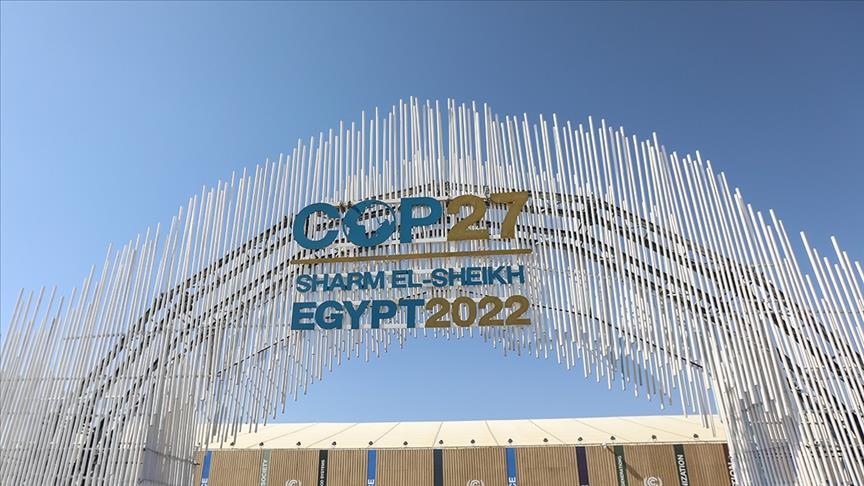The United Nations (UN) appointed expert group released a roadmap outlining clear standards and criteria to be followed when developing net zero commitments, drawing red lines around greenwashing and demanding honest climate counting to reduce emissions.
The report of the High Level Expert Group on Net Zero Emissions Commitments of Non-State Entities was launched Tuesday during the 27th Conference of Parties (COP27) to the UN Climate Convention, running from Nov. 6 to 18 in Egypt's Sharm El-Sheikh.
The Expert Group, comprised of 17 independent experts from around the world, was established at COP26 in Glasgow by UN Secretary General Antonio Guterres to address a "surplus of confusion and deficit of credibility" regarding non-state entity net zero targets.
The report sets out ten practical recommendations for achieving net zero integrity, transparency, and accountability by establishing clear standards and criteria. These recommendations aim to crack down on greenwashing and weak net zero commitments, which threaten to undermine global efforts to reduce greenhouse gas emissions in accordance with the 1.5-degree target.
Catherine McKenna, chair of the UN-appointed expert group and former Canadian Minister of Environment and Climate Change, said the report would provide a crucial roadmap to bring integrity to net zero commitments by industry, financial institutions, cities and regions.
"After consulting with hundreds of individuals and organizations and incorporating the latest research and science, we have a roadmap to ensure that net zero commitments by industry, financial institutions, cities and regions are ambitious, transparent and credible," she said.
"This is about cutting emissions, not corners. Our roadmap provides clear standards and criteria that must be followed when developing net zero commitments. Right now, the planet cannot afford delays, excuses, or more greenwashing."
-Net zero pledges should align with scenarios from Intergovernmental Panel on Climate Change
The expert group's report calls on non-state actors to commit to immediate reductions in absolute emissions across their value chains with short-, medium- and long-term, science-based targets.
Guterres remarked during the launch of the report that although a growing number of governments and non-state actors are pledging to be carbon-free, which he said is good news, the problem is that "the criteria and benchmarks for these net zero commitments have varying levels of rigor and loopholes wide enough to drive a diesel truck through."
"We must have zero tolerance for net zero greenwashing," he warned.
Guterres said that net zero pledges must be in line with the Intergovernmental Panel on Climate Change (IPCC) scenarios limiting warming to 1.5 degrees, meaning that global emissions need to decline by at least 45% by 2030 and reach net zero by 2050.
- Guterres to fossil fuel companies: "Sham must end"
According to Guterres, pledges should have interim targets every five years starting in 2025 and cover all greenhouse gas emissions.
"Using bogus 'net zero' pledges to cover up massive fossil fuel expansion is reprehensible. It is rank deception. This toxic cover-up could push our world over the climate cliff. The sham must end," he said.
He further added that net zero plans should be publicly available to ensure credibility and all existing net zero voluntary initiatives need to explain how they will align and revise their standards accordingly by the first half of 2023.
Stressing that full transparency is critical, he said, "and all new initiatives must abide by these recommendations."
"Governments need to ensure that these voluntary initiatives become the 'new normal'. I urge all government leaders to provide non-state entities with a level playing field to transition to a just, net-zero future. Solving the climate crisis requires strong political leadership. The G20, together with all OECD countries, must accelerate the decarbonization of their economies and end their addiction to and subsidies for fossil fuels," he noted.
According to the expert group's report, non-state actors must report publicly on their progress with verified information to prevent dishonest climate accounting and other actions designed to circumvent the need for deep decarbonization.
In line with the recommendations in the report, non-state actors can no longer claim to be net zero while continuing to build or invest in new fossil fuel supplies, buy cheap credits that often lack integrity instead of immediately cutting their own emissions across their value chain, or lobby to undermine ambitious government climate policies.
To effectively prevent greenwashing and ensure a level playing field, non-state actors need to move from voluntary initiatives to regulated requirements for net zero.
"If fossil fuel companies think that they can expand production under a net zero target, they need to think again." Malango Mughogho, an expert group member and managing director of ZeniZeni Sustainable Finance, said. He continued by saying that if net zero is done correctly and with a fair share in mind, it can speed up the energy transition while also incorporating resilience.
By Nuran Erkul Kaya in Sharm El-Sheikh, Egypt
Anadolu Agency
energy@aa.com.tr


